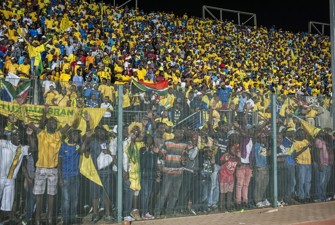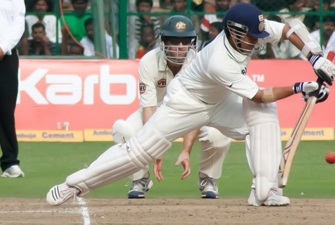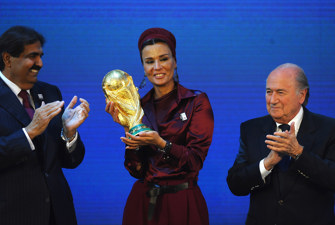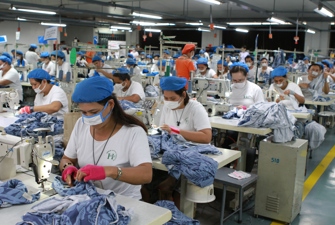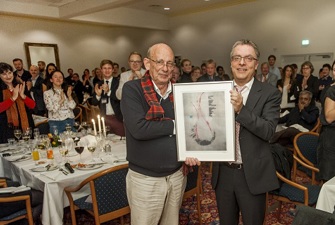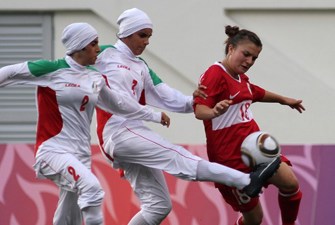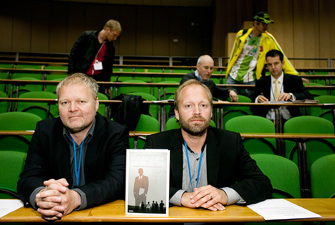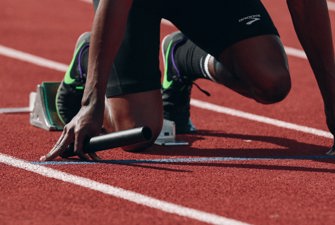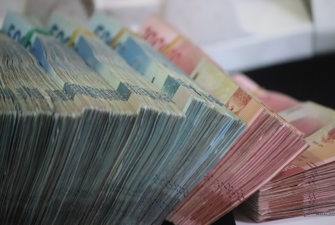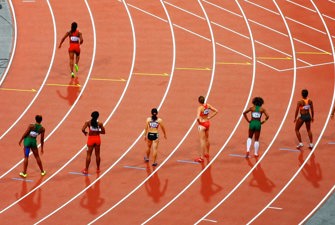Sport in Development Countries - Who's in charge?
It was during the era of colonialism that modern sport was introduced into the developing countries by either the military, teachers, or missionaries come to spread the good word.
Football, the world's most popular sport, was, for example, introduced to Africa, in Ghana (formerly Gold Coast) to be precise, towards the beginning of the last century.
While the different expeditions landed at the coastal towns with their Bibles or musketeers, a certain Mr Briton, a teacher of Jamaican origin, took a football. So the first Africans to play, and barefoot at that, with a leather ball, were the pupils of the Cape Coast Government school. In the neighbouring country of Ivory Coast, it was an Afro-Caribbean sergeant by the name of Leprince who saw to the introduction of football in a school in Bingerville. Cricket, hockey and polo were only successful in British colonies with large Indian and Pakistani communities.
What was extraordinary was that the pupils lucky enough to go to schools where football was played easily managed to pass on the rules of the game to their friends in their neighbourhood. So one could say that even before learning the alphabet one knew by heart such English words as goal, penalty, corner, offside, etc. Even now, all those who have never gone to a school where English or French is taught and who have done their studies in their mother tongue still use English words to talk about sport.
Moreover, if today we are familiar with the names of certain countries or major cities around the world it is not thanks to geography lessons but because of Olympic champions, well-known footballers and international competitions.
Education through sport is also knowing the laws of the game, the statutes and the rules of each International sports Federation.Is it not wonderful to see the whole world respect the same rules of the game and adhere to the Olympic Movement regardless of their political system, ideology or religion?
Women in sport
Women, the driving force in the economic and social development in developing countries, even today remain unhappily confronted with traditional and religious problems which prevent them from blossoming out in sport. If it is the boy's right to amuse himself, the girl must use her free time to be initiated into cooking, sewing and household tasks. But during a war, the woman has to fulfil the same obligations as a man as well as all her other duties. Nonetheless, she practices all the physical exercises that living in under-developed rural areas imposes on her. It is the woman who fetches water from the river and wood from the forest, carrying it all on her back or her head. I have known women who have trotted into town from the countryside each morning to sell one or two litres of milk, and then returned home in the same way. What these poor but dignified innocents did not know was the distance they had to cover every day, give or take a couple of kilometres, was that of a marathon.
Women's sport in developing countries is still very much in its infancy.
Without wishing to generalize, ancestral traditions are unavoidable handicaps in certain countries, and often stop girls practising sport. It is nevertheless the duty of each and every one of us to work tirelessly to ensure that womens sport has all the help it needs for its development and its management. Women must reach positions with responsibilities at the national and international level in the sports movement.
Olympic Games
We have just witnessed the celebration of the Games of the XXVII Olympiad in Sydney, Australia, labelled by the IOC President as the best Olympic Games ever.
A new record was set in Sydney when athletes from 80 National Olympic Committees received medals. From the 472 Olympic Solidarity scholarship-holders who qualified for the Sydney Games in their respective sports, 64 of them (29 women and 35 men) obtained medals - 28 gold, 21 silver and 21 bronze, and 92 others received diplomas.
Among the poorer countries, Ethiopia was placed 20th out of 199 in the world, first in Africa, and second in athletics after the United States of America with eight medals including four gold.
An economic study carried out by Price Waterhouse Coopers indicates that based on the economic strength of each country that took part in the Sydney Olympiad, Ethiopia comes first followed by the Bahamas and Jamaica.
When the Ethiopian athletes returned home from Sydney, one million people showed up to welcome them. Of course there were welcome parties everywhere and all governments did not miss the opportunity to exploit the situation for political reasons by offering gifts, decorations and money to the Olympic heroes. And yet, in between the staging of the Games, the governments in developing countries do not provide the necessary assistance for the development of physical education and sport.
From what we witness in our daily life, sport has become a phenomena of our society. Unfortunately, physical education in schools has become a victim not only of budget cuts but of all types of reforms. The governments themselves are more concerned with the elite and professional sports than sport for all, especially school and university sport. Once upon a time the best athletes were recruited from secondary schools and colleges, this is no longer the case in some countries.
The African Olympic athletes results, which were mainly in track and field, with the exception of football, are like a tree which hides the forest. It is only thanks to the naturally gifted athletes and their own personal sacrifices that satisfactory results are obtained. When people ask me how East African athletes become very good long-distance runners, I simply reply that they have no cars, no buses and no subways, and thus have to walk or run with their own God-given personal and private transportation system.
In order to develop all sport you need infrastructure, coaches, technicians, health care and financial means. Due to economic difficulties and poverty, the above-mentioned requirements are not met, and it is not marketing policy or sponsors that can solve the problem.
The governments remain the sole sponsors for developing physical education and sport and taking care of the populations needs. Sponsors can only handle elite sport and professional clubs in countries with strong economic power. In less developed countries, where there are only few companies and industries that are usually faced with much demand for sponsorship, you get practically nothing. The culture of sponsorship does not even exist, except for providing cups or products as a raffle prize.
Technical assistance
On the occasion of the Olympic Congress in Baden-Baden in 1981, the former president of the International Amateur Basketball Federation, Robert Busnel declared: "Saint Exupry used to say: It is not the intelligence which rules the world, but the spirit." In order to conserve the spirit of Olympism, and before sending experts to carry out courses, "it would be more rational to have a course for experts?" And the former president of FIFA, Joao Havelange, went one better by saying: "We are all convinced of the importance which the idea of the development of sports in the Third World can generate. We may be proud of it. But we must be aware that we are working with equal partners, attentive and well informed and, who, with reason, are critically opposed to those doubtful enterprises too often hidden behind the word 'development'." The developing countries in general and Africa in particular take on experts who are assigned either by bilateral agreements or by international sports organizations.
When the real pedagogues, who are familiar with the reality in developing countries, make themselves scarce or are not available, others are blindly recruited only to honour the contracts. Of course, each expert possesses his diploma, but not the necessary experience.
Because there is no preliminary study or appropriate inventory of the local requirements, errors may often result. And contrary to the practice of specialized agencies of the United Nations, which recruit African, Asian and Latin-American experts to work in their own regions, the sports world restricts itself - apart from a few exceptions - to experts from Europe, and North America. I admit that there are technical domains which are not open for all and where experts are needed. But there are also domains and disciplines in which the experts of the other continents are highly qualified and should, like others, be entrusted to lead courses and projects. Of course, we do not want to lump everyone with those splendid experts, who call themselves "specialists" in their field after one week's stay in a five-star hotel in a developing country. Life is a permanent school, where every one of us can learn from the other.
The problem with the experts available for the developing countries is that they are not all at the same level, the best technicians are only negotiable in dollars. Despite this, we must not forget the few highly qualified coaches, consultants and advisors who provide inestimable service to these regions.
Unfortunately some leaders still believe that only a "foreigner" can achieve excellent results. They often forget that the players of a national team, committed to the care of a foreign coach, were first discovered and trained by local technicians. What developing countries really need are teachers who can train coaches, technicians, and physical education instructors on sport so that these countries can be self-reliant in the future. We Africans must also have confidence in ourselves. It is thanks to Algerian, Cameroonian, Ethiopian, Kenyan, Moroccan, Mozambican and Nigerian coaches that all the athletes and footballers managed to obtain medals in the Sydney Olympiad.
The International Olympic Committee, through the Olympic Solidarity fund and the international and continental sports federations, is also providing technical and financial assistance. In fact it is the only assistance which the sports federations receive directly. The other source being the bilateral agreement signed with an industrialized nation.
This is why the IOC President, Juan Antonio Samaranch, said at the Centennial Olympic Congress in Paris in 1994, that "the National Olympic Committees should maintain excellent relations with their respective governments, and in particular with the ministries of Youth and Sport, National Education, Health and the Environment. Under the constitution of each sovereign state, they have the responsibility of providing education and health care for the population. Our contribution must be sizeable, meaningful and complementary."
Choice of methods
One of the problems which hinders sports development is the lack of exchanges of experience. We know that every country has its own sports policy, but many of the methods used in the industrialized countries are highly suitable for developing countries, and the experts forget to draw attention to these. Helped by economic interests, they prefer to suggest costly operations.
Here are some examples. In the majority of towns and villages in the industrialized countries, the local population is allowed access to the sports facilities of the region's schools once classes have finished. Yet in countries which really do lack infrastructure, this kind of use is not standard practice. Although competitions are often organized in conference halls or cinemas, exhibition halls, large circus tents or similar facilities are neglected. It is rare that these poor countries are offered easy, appropriate solutions which everyone can afford.
But there are exceptions. An expert from New Zealand went to a Pacific island to lead an athletics course. Once there, he discovered that there were no hurdles, discuses, javelins or shot puts. This ingenious man did not go home again; instead he made hurdles out of bamboo, used coconuts as shot puts and finished the course to the satisfaction of all concerned.
On the island of Tuvalu, for example, the only area available acts as a landing strip for aircraft, football pitch and a golf course.
These few examples show that it is possible to develop sport with the means available, making sacrifices only to prepare the elite groups called upon to take part in international competitions. It seems obvious and appropriate to list all these methods so that each organization can make better use of all types of facilities.
In fact, the most neglected area, to which little importance is attached in the sports development process in the majority of countries, is administration. How can a project be executed correctly, a sports discipline developed, or contacts with international organizations and confederations maintained without the backing of a solid, efficient and methodical administration? One of the reasons is the lack of good administration and the extremely precarious situation in which the management of the national sports federations has to work.
For example, a bad result in an international competition is reason enough for the minister in charge to dissolve the respective federation, or the executive committee to be discharged after the settlement of personal accounts, or the minister himself to be fired. Archives disappear. And because there is no permanent administration which would be able to plan the activities of the organization on a long-term basis, the newcomers hinder continuous and systematic action because they do not take into account the work of their predecessors. The lack of continuity within the leadership, especially of football federations, in developing countries is an almost constant problem to which no solution has yet been found.
Equipment
Before our society became a consumer society, children made their own tools; particularly in the field of sport. Footballs were produced from old rags: the cover was stuffed with hair gathered from the barbers at the corner. Naturally, these balls lacked all bounce; ground football was all that was possible.
The imagination of the young people at that time was remarkable. Later, leather balls appeared in the big cities and you could often see young football players in garages getting the ball pumped up or at the shoemaker's to get them patched up. In my native Africa, it often happened that the field of play was surrounded by cacti so that the ball hit the spines and the air escaped, which considerably handicapped the course of play. Football boots were out of the question. As these were not available, the players wrapped their feet with rags to avoid injuries. Since the teams did not have jerseys, it was often not easy to tell team mates and adversaries apart. The games were conducted with an innate spirit of fair play. To play football on stretches of waste ground with no lines marked out and no referees, and without squabbling and bickering, one certainly has to be good-natured. It is thus essential to particularly stress the educational aspect of fair play in the training of sport people so that they will act honestly not only on the sports field but also in daily life.
In the developing countries, particularly in rural areas, these scenes have hardly changed, despite visible signs of progress and modernization in other sectors. Apart from a limited few who can afford such a luxury, only the players and athletes of clubs affiliated to national sports federations possess the appropriate equipment.
We must not forget, however, that the price of one pair of shoes made in Europe or North America exceeds three or four months salary of a labourer in the least developed countries.
Some of the components of most of the articles which are sold worldwide under the label of the big firms have certainly been manufactured in Africa and Asia, where labour costs are much cheaper, yet the selling price is not reduced accordingly. It has to be admitted sadly that the commercial success of these goods would be inferior if they were sold with an unknown label and not a famous one. The only way to find a satisfactory solution for all, with respect to the problem of sports equipment, is to strive for a North-South and South-South dialogue and a change in mentality. The transfer of technology, the setting up of small and light scale industries, and the liberalization of commercial exchanges, mainly between the Southern countries themselves are, in my opinion, subjects worth thinking about.
The foundation of industrial companies for the production of sports equipment with local materials at reasonable prices must become a target. At present, efforts to develop local production are still insignificant. Sports leaders should use the skills of the fishermen to at least produce nets for basketball, football and volleyball locally.
Due to the rapid increase in all kinds of regional games and competitions, each developing country now feels obliged to build luxury stadiums in order to become an organizer. The architects and engineers who are entrusted with the execution of such projects do not hesitate to exploit fully the developing countries. These stadiums, which cost millions of dollars, can seldom be used efficiently and because qualified personnel are not available, the maintenance leaves a lot to be desired.
Nevertheless, the realization of model sports infrastructure for the benefit of the public at large should not be neglected. Above all, local authorities should be encouraged to include playgrounds in the urbanization plans of communities, as there is an unbelievable lack - not to say a complete non-existence - of these facilities.
International cooperation
There has long been international cooperation in the political, economic and social spheres between the member states of the United Nations, but the same is not true in the areas of physical activity and sport. The creation of a Ministry of Youth and Sport by certain governments is a recent phenomenon, Previously, physical education and sport were covered by departments within the education ministry. In any case, the Ministry of Youth and Sports is the poor relation in all governments. The physical education teacher still inspires nothing but disdain in most of the developing countries. Yet, without making a comparison between school subjects, physical and sports education are an indispensable element in the education of an individual: "Mens sana in corpore sano".
Indeed, countries like Australia, Belgium, Canada, France in particular, Germany and the Scandinavian countries, have introduced physical education and sport into the concept of international cooperation.
The International Olympic Committee has signed cooperation agreements with several United Nations specialized agencies for joint projects involving, in particular, preventive education for young people and the promotion of Sport for All, health for all and education for all. The IOC also maintains relations with, among others, the school, university, military and disabled sports movements.
It happens that several governmental and non-governmental organizations often launch similar projects in the same country or region. Through a lack of consultation, considerable amounts of money and energy are wasted. There may not be enough coordination between different national sports organizations either. Each body reports to a different international organization, and sometimes several bodies ask for the same kind of technical assistance. It is useful and necessary to harmonize development projects, make investments worthwhile, use human resources advisedly, pinpoint needs, draw up a list of priorities and establish a coordination mechanism at the national and international level.
It is our hope that all people, and particularly the children and youth, have access to physical and sports activities. I would like to stress that everything is linked to economic development, democracy, social justice, education and a decent standard of living in all the countries currently receiving technical assistance. One cannot talk about physical activity and sport to people living on the poverty line. The priority is survival.
When it comes to choosing between providing schoolbooks, pencils, blackboards, chalk and balls, the Ministry of National Education has no hesitation in opting for the school books rather than the balls. It is of vital importance that the developing countries have more university graduates capable of bringing it out of its under-developed state than champions who bring it home medals. For us Africans, our priority of priorities still remains our economic and social development. It is happy coincidence nevertheless that sport can play a role in this process. School and university sport is therefore non-existent in the majority of such countries.
Without training for young people, there is no salvation in sport, hence the need for technical assistance at government level, and establishing a long- and short-term policy for developing physical and sports activities.
The sports movement is composed of and led by volunteers who deserve respect, and not to be exploited for political or personal interest. For someone like myself, who is still a student in the biggest university in the world, that of life, who maintains that, to some extent, poverty teaches you to be imaginative and resourceful, there is no doubt that a dedicated leader will find solutions to his many needs. While recognizing the interdependence of this world in which we live and the need for cooperation and solidarity, I feel that, in the final analysis, the development of physical activity and sport in a given country should rely first and foremost on its own strengths and means and then welcome technical assistance.
Media
A study I made for the IOC back in the 1980s at Regional Games (Africa, Asia, Pan America), proved that 80% of journalists from developing countries are football specialists and the remaining 20% covering other sports which are more popular than football in their respective countries. Due to the lack of specialists on each sport, most journalists like myself had to cover all the facets of sport. Lacking means, rare are the National Olympic Committees and sports federations who publish bulletins or brochures giving details of their activities, at the same time spreading technical, educational and scientific information.
There are no well-established information and documentation centres on physical education and sport to consult, or enough libraries and bookstores from where to borrow and buy books. This situation alone makes it difficult for journalists, technicians and researchers to improve their knowledge and follow the changes and innovation in world sport.
The history of sport of our countries and regions has yet to be written. The historical documents of our forefathers have disappeared or been misplaced. Those who have witnessed the history of sport of their countries and continent are taken away by age or other causes without having written their memoirs. We say in Africa that the death of an elderly person is like a library which burns. For my part, I am going to take up the challenge before it is too late.
It is indeed a pity that students who have been educated in foreign universities and institutions often go on writing their thesis or dissertation on aspects of modern sport that have been amply covered by Western authors rather than on their own country or region.
The media in most developing countries is state-owned, apart from a few exceptions. Censorship is therefore the main weapon which controls the behaviour of the mass media. Self-censoring has even become a qualification for journalists in developing countries.
Meanwhile, the government-controlled media, although heavily subsidized, owes more to the sports columns that provide sales, rather than politics. Sports broadcasts on radio and television are the most popular. In spite of economic crisis, the Ministries of Information do their utmost to obtain TV rights for major sports events, such as the Olympic Games and the football World Cup.
It is true though that even in the field of sports news, negative aspects are emphasized much more than positive aspects as far as developing countries are concerned in the Western media. You will rarely find a reference to Asian or African sport in the so-called international press. It is only when athletes win gold medals at the Olympic Games, World Championships, or when teams perform well at the football World Cup, that you can read a short account on them.
On the other hand, the developing countries press has unconsciously become a relay for the Western press by presenting, every day, the results of European championships or the portrait of big stars. Under these conditions, the question is very rarely asked about why so much space is given to European sport and so little to Africa, Asia or Central and South America. So why does the West, which monopolizes the information distribution system, not try to provide news on sport from developing countries. That is why it is said that one-way information is an arbitrary trademark of an unequal communication system.
It is clear that the perception of information varies from country to country, depending on its political system. However, I do not think that the situation will change as long as democracy, the right of expression in all its forms, have not been consolidated in the vast majority of developing countries, and that modern technology and the necessary means are not made available.
Sports fans in developing countries will therefore continue to be knowledgeable about European football, Manchester United, Ronaldo and will know less or nothing about the Olympic football champion, Cameroons national team, or the new Asian football champion, Japan.
In any event, Olympism and sport development do not really interest many journalists, unless it is of a sensational nature. I still believe, anyhow, that journalists in developing countries should be concerned with overall social and cultural development, of which physical education and sport are an integral part.
In addition, I believe that we have to assume the responsibility of participating in the education of the masses. If violence around sport and racial discrimination has become a common practice today and if the message on fair play and tolerance is not clearly understood, this is partly due to the fact that we have failed to do our job well. It is evident that the journalist who suffers from chauvinism and nationalism is more dangerous because of his mobilizing power.
Sport journalism is one of the best professions you could dream of, even if you are not well paid, unless you are a television star and if you always respect the code of ethics. Unfortunately, we live in a society which is more attracted by sensational news which helps newspapers make profit and good business. The good newspapers are still around regardless, even though you read more news about football than any other sport.
Sports news is news which is directly shared with the readers, listeners and viewers in most cases.
Criticism is good when it is constructive and not destructive. I believe that the sports press can play a significant role in the society by using sport as an instrument to promote peace, human rights, justice and democracy, the fight against racial discrimination, drug abuse and violence, the protection of the environment, eradication of poverty, and for sport for all. It is not sensational but it is worthwhile.
We should not forget either that it was good intentioned journalists from the daily French newspaper LEquipe who invented the European Club Football Championships and the Tour de France.
The year 2001 has been proclaimed the International Year of Volunteers by the United Nations General Assembly. As you well know, the Olympic Movement is the largest volunteer movement. Let us pledge therefore, during the course of 2001, to pay tribute to all the volunteers serving sport in our respective countries.
-To conclude this presentation, what better way than to quote the interpretation of the IOC motto by the Swiss educator Dr Paul Martin, in his book "To the tenth of a second":"
CITIUS, faster, not just the feet, but also in the sense of speed of comprehension and sharpness of mind.
ALTIUS, higher, not just towards a goal, but also towards the moral growth of the individual.
FORTIUS, stronger, not just for events in the stadium, but also to face the trials of life."
